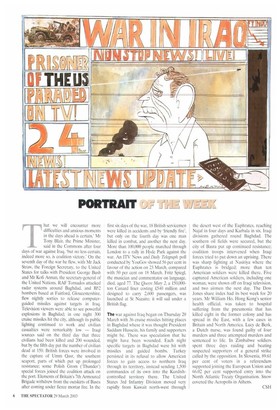hat we will encounter more difficulties and anxious moments in
the days ahead is certain.' Mr Tony Blair, the Prime Minister, said in the Commons after four days of war against Iraq. 'but no less certain, indeed more so, is coalition victory.' On the seventh day of the war he flew, with Mr Jack Straw, the Foreign Secretary, to the United States for talks with President George Bush and Mr Kofi Annan, the secretary-general of the United Nations. RAF Tornados attacked radar systems around Baghdad, and B52 bombers based at Fairford, Gloucestershire, flew nightly sorties to release computerguided missiles against targets in Iraq. Television viewers were able to see powerful explosions in Baghdad; in one night 300 cruise missiles hit the city, although its public lighting continued to work and civilian casualties were remarkably low — Iraqi sources said on the third day that three civilians had been killed and 200 wounded, but by the fifth day put the number of civilian dead at 150. British forces were involved in the capture of Umm Qasr, the southern seaport, parts of which put up prolonged resistance; some Polish Grom ('Thunder') special forces joined the coalition attack on the port. Elements of Britain's 7th Armoured Brigade withdrew from the outskirts of Basra after coming under fierce mortar fire. In the
first six days of the war, 18 British servicemen were killed in accidents and by 'friendly fire', but only on the fourth day was one man killed in combat, and another the next day. More than 100,000 people marched through London to a rally in Hyde Park against the war. An ITV News and Daily Telegraph poll conducted by YouGov showed 56 per cent in favour of the action on 23 March, compared with 50 per cent on 18 March. Fritz Spiegl, the musician and commentator on language, died. aged 77. The Queen Maly 2, a 150.000ton Cunard liner costing £540 million and designed to carry 2,600 passengers, was launched at St Nazaire; it will sail under a British flag.
The war against Iraq began on Thursday 20 March with 36 cruise missiles hitting places in Baghdad where it was thought President Saddam Hussein, his family and supporters might be. There was speculation that he might have been wounded. Each night specific targets in Baghdad were hit with missiles and guided bombs. Turkey persisted in its refusal to allow American forces to gain access to northern Iraq through its territory, instead sending 1,500 commandos of its own into the Kurdishcontrolled territory there. The United States 3rd Infantry Division moved very rapidly from Kuwait north-west through
the desert west of the Euphrates, reaching Najaf in four days and Karbala in six. Iraqi divisions gathered round Baghdad. The southern oil fields were secured, but the city of Basra put up continued resistance; coalition troops intervened when Iraqi forces tried to put down an uprising. There was sharp fighting at Nasiriya where the Euphrates is bridged; more than ten American soldiers were killed there. Five captured American soldiers, including one woman, were shown off on Iraqi television, and two airmen the next day. The Dow Jones share index had its best week for 20 years. Mr William Ho, Hong Kong's senior health official, was taken to hospital suffering from the pneumonia that has killed eight in the former colony and has spread in the East, with a few cases in Britain and North America. Lucy de Berk, a Dutch nurse, was found guilty of four murders and three attempted murders and sentenced to life. In Zimbabwe soldiers spent three days raiding and beating suspected supporters of a general strike called by the opposition. In Slovenia, 89.61 per cent of voters in a referendum supported joining the European Union and 66.02 per cent supported entry into the North Atlantic Treaty Organisation. Snow covered the Acropolis in Athens.
CSH








































































 Previous page
Previous page